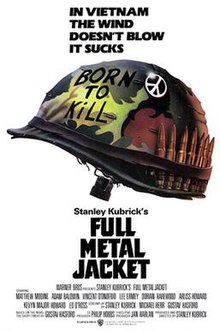
THRILL SCALE 1-10
6
HAVE I SEEN IT BEFORE?
Yes, 15+ years ago
BEST SEQUENCE
The climax of the boot camp sequence is filmed like a horror movie and it is genuinely chilling
BEST LINE
"Bullshit. I bet you could suck a golf ball through a garden hose." - Gunnery Sergeant Hartman
ROTTEN TOMATOES SCORE
92%
ROTTEN TOMATOES CRITICS CONSENSUS
"Intense, tightly constructed, and darkly comic at times, Stanley Kubrick's Full Metal Jacket may not boast the most original of themes, but it is exceedingly effective at communicating them."
IMDB SYNOPSIS
"A pragmatic U.S. Marine observes the dehumanizing effects the Vietnam War has on his fellow recruits from their brutal boot camp training to the bloody street fighting in Hue."
THOUGHTS
- Not only is this our first Stanley Kubrick film, it's also our first war movie, of which there will be several. And I'll admit, the war movies may be a little hard for me to assess. The actuality of the Vietnam War, the sheer destruction and loss that result from any war, the inhumanity that occurred during this time period, these are all pretty heavy topics to unpack in my silly little blog in which I wax poetic about Dennis Hopper blowing up a bus. To assign a Thrill Score to a movie like Full Metal Jacket feels glib at best, insensitive at worst. Just know that we are still treating these movies as movies, and we are not necessarily addressing the concepts behind these films. War is not thrilling, war is not action-packed. War is terrible, and war is Hell
- And to be fair, most war movies take this exact same point of view. Full Metal Jacket has a particular focus on the way war dehumanizes its active participants. We spend the first 45 minutes of this movie going through Marine boot camp, during which the recruits are emotionally disassembled through physical, verbal and mental abuse, only to be reassembled into pliant, obedient weapons. This effect lasts through the rest of the movie, as well. The characters are rarely ever referred to by their actual names, they mostly go by the nicknames assigned by their brutal drill instructor, Gunnery Sergeant Hartman, played by R. Lee Ermey
- Famously, before acting in this movie, Ermey was a real drill instructor and he started as just a technical advisor for Kubrick. He was then cast in the movie, and ad-libbed most of his lines. If you can get past the homophobic, fatphobic and racist abuse he heaps on the recruits, you can definitely find some pitch-black comedy in parts of this performance. He then went on to have a fairly long film career, including as the voice of the main Army Man, Sarge, in Toy Story. I can guarantee you there are some pretty amazing mashups of these two movies out there on the interwebs
- Vincent D'Onofrio appears, also in his first major film role, playing Private Pyle (nicknamed after Gomer Pyle, incidentally, a character from The Andy Griffith Show who went on to have a Marines-based spinoff show). Private Pyle receives the brunt of Hartman's ire, culminating in the above-mentioned climax of the boot camp sequence. Christian Bale and Robert De Niro are always brought up as actors who go through extreme physical transformations for roles, but check out Vincent D'Onofrio! These two movies both came out in 1987! (Full Metal Jacket and Adventures in Babysitting)

- After the boot camp sequence, we then go to Vietnam with the Marines, and the movie becomes a bit more of a generic war movie. There are some notably difficult scenes in which the Marines' utter disregard for the enemy is on full display. They do not see the Vietnamese soldiers, or even the civilians, as human beings; they see them as things to kill, as they were trained. This is the kind of movie in which the concepts of "good guys" and "bad guys" become increasingly murky, even just amongst the Americans
- We end with a fairly tense scene in which an American squad is pinned down by a Vietnamese sniper. They are eventually forced to confront the enemy as an individual person, and they are left with a choice between mercy and indifference. Of the latter half of the movie, this part is definitely the most effective
- When it came out, Full Metal Jacket was somewhat overshadowed by Platoon, which won the Best Picture Oscar for 1986, and which we'll be talking about a little later (it's #72 on the list). On rewatch, I remembered the boot camp sequence pretty well, but I was surprised by how little I remembered of the Vietnam section. I don't think it's the most effective war movie I've ever seen, but the more I've been thinking about it to write this review, the more of an effect it's had on me. This is a very good movie. But I don't necessarily think it's thrilling, at least not in the way I like my thrills. If this description intrigues you, though, I recommend watching it if you haven't
No comments:
Post a Comment